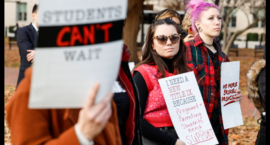The United States Department of Education last week released its much-anticipated amendments to the existing Title IX regulations—which prohibits discrimination on the basis of sex in any education program or activity that receives federal financial assistance.
The amendments make substantial changes to the existing Title IX regulations. Experts anticipate these new changes will result in an increase in the number of Title IX complaints, since they broaden the protections of Title IX. The Education Department is requiring all schools implement the new 2024 regulations by Aug. 1.
Here are nine significant changes to Title IX that interested parties in higher education should know.












